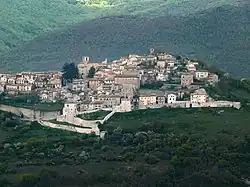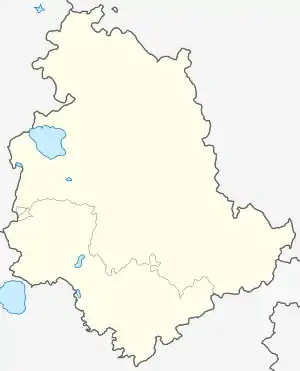Monteleone di Spoleto | |
|---|---|
| Comune di Monteleone di Spoleto | |
 View of Monteleone di Spoleto | |
|
Coat of arms | |
Location of Monteleone di Spoleto | |
 Monteleone di Spoleto Location of Monteleone di Spoleto in Italy  Monteleone di Spoleto Monteleone di Spoleto (Umbria) | |
| Coordinates: 42°39′5″N 12°57′6″E / 42.65139°N 12.95167°E | |
| Country | Italy |
| Region | Umbria |
| Province | Perugia (PG) |
| Frazioni | Butino, Rescia, Ruscio, Trivio |
| Government | |
| • Mayor | Marisa Angelini |
| Area | |
| • Total | 61.58 km2 (23.78 sq mi) |
| Elevation | 978 m (3,209 ft) |
| Population (28 February 2010)[2] | |
| • Total | 648 |
| • Density | 11/km2 (27/sq mi) |
| Demonym | Monteleonesi |
| Time zone | UTC+1 (CET) |
| • Summer (DST) | UTC+2 (CEST) |
| Postal code | 06045 |
| Dialing code | 0743 |
| Patron saint | St. Nicholas |
| Saint day | 6 December |
| Website | Official website |
Monteleone di Spoleto (in Antiquity, the Roman town of Brufa), is a town and comune of Italy, in the province of Perugia in southeast Umbria at 978 meters (3209 ft) above sea-level overhanging the upper valley of the Corno River. It is one of the more remote towns in Umbria, on a mountain road from Norcia and Cascia (33 km and 12 km NNE respectively) to Leonessa and Rieti in the Lazio (10 km S and 51 km SSW). It is one of I Borghi più belli d'Italia ("The most beautiful villages of Italy").[3]
The population of the comune was 648 in 2010, with the town proper accounting for about half of that; the frazioni of Monteleone are Butino, Rescia, Ruscio, and Trivio.
History
Monteleone is famous for one of the world's great archaeological finds: a 6th‑century BC Etruscan chariot that quickly followed the path of money and by the early 20th century had already wound up in the Metropolitan Museum in New York. A copy of the chariot is on display in Monteleone. There remain, however, few if any traces of the town's Roman days: destroyed and rebuilt by the Spoletans in the 12th century, it offers at present an essentially medieval appearance.
Main Sights
The main monument in Monteleone is the 14th-century church of San Francesco, with a cloister now serving as a lapidary museum, a Gothic door and a fresco of Christ crucified in the full robes of a bishop, with a loaf of bread under one foot and a chalice of wine under the other. Under the cloister a second church can be seen, complete with a 14th‑century fresco. Other monuments include several other medieval churches, the 15th‑century Palazzo Bernabò, and vestiges of the town's medieval walls, including a clock tower.
References
External links
- Pro Loco (The town's volunteer tourist bureau)
- Archeoambiente